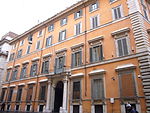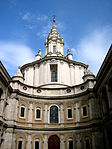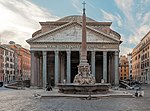Sant'Eustachio
17th-century Roman Catholic church buildings in Italy18th-century Roman Catholic church buildings in Italy8th-century churches in ItalyBasilica churches in RomeChurches of Rome (rione Sant'Eustachio) ... and 1 more
Titular churches

Sant'Eustachio [santeuˈstaːkjo] is a Roman Catholic titular church and minor basilica in Rome, named for the martyr Saint Eustace. It is located on Via di Sant'Eustachio in the rione Sant'Eustachio, a block west of the Pantheon and via della Rotonda, and a block east of Sant'Ivo alla Sapienza and the Via della Dogana Vecchia.
Excerpt from the Wikipedia article Sant'Eustachio (License: CC BY-SA 3.0, Authors, Images).Sant'Eustachio
Piazza di Sant'Eustachio, Rome Municipio Roma I
Geographical coordinates (GPS) Address External links Nearby Places Show on map
Geographical coordinates (GPS)
| Latitude | Longitude |
|---|---|
| N 41.8987 ° | E 12.4757 ° |
Address
Sant’Eustachio in Campo Marzio (Basilica di Sant'Eustachio)
Piazza di Sant'Eustachio
00186 Rome, Municipio Roma I
Lazio, Italy
Open on Google Maps








